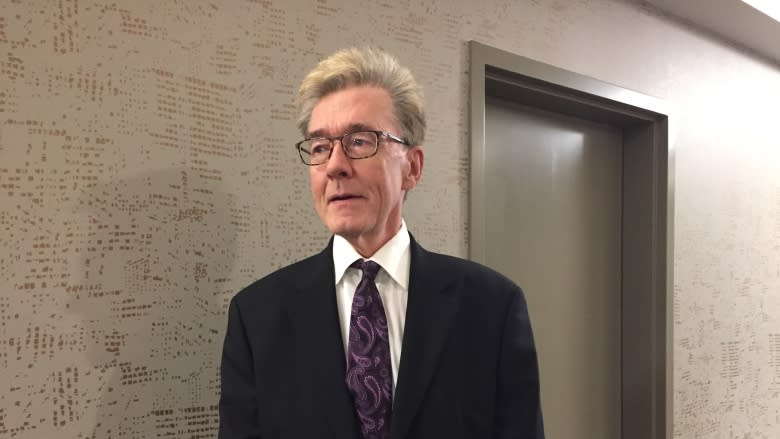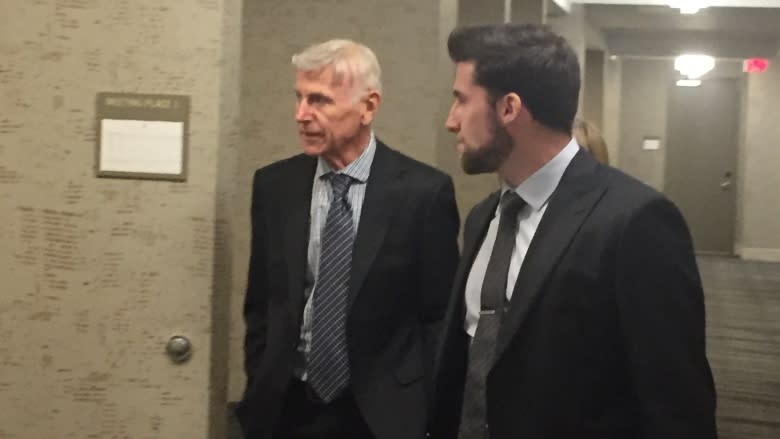Amber Athwal left alone for up to 7 minutes before suffering cardiac arrest, expert says
An Edmonton anesthesiologist believes Amber Athwal was left unattended and not monitored after a dental procedure for up to seven minutes before she suffered cardiac arrest.
Dr. Scott Paterson told a dental college hearing that it never should have reached that crisis point, had the recovery room nurse been doing her job properly.
"It takes a certain amount of time for the crisis to develop," Paterson said. "Should have been recognized, should have been avoided."
Paterson was called as an expert witness at the tribunal hearing evidence against dentist Dr. William Mather. Paterson, an Edmonton anesthesiologist, has performed over 15,000 dental anesthetic procedures, including several thousand on children.
Mather faces five counts of unprofessional conduct related to his treatment of the four-year-old girl on Sept. 7, 2016. He has pleaded guilty to three of the charges.
Amber's sedation and dental surgery was uneventful and ended at 12:15 p.m. that day.
Mather left the surgical suite to see other patients and left registered nurse Tasneem Ali in charge.
When Ali testified earlier this week, she told the tribunal she was constantly looking at Amber in the recovery room and kept a close eye on the monitor measuring her vital signs. Ali admitted she left the room once, very briefly.
"As I'm watching my patient, I go and soak the mask," she said. "And then I'm watching her. Monitors are looking good. And then I'm watching patient for her to wake up."
Ali insisted the medical crisis happened all at once.
"At some point I noticed the oxygen saturation wasn't picking up. It was not reading on the monitor. That's when I realized something was not right," she testified.
"I looked at the child. Saw that she was looking pale. And I realized the chest was not rising."
Paterson called the nurse's version of events "impossible."
"It didn't take the snap of a finger, as Tasneem stated in her testimony," Paterson said.
"It could have been as long as seven minutes."
Crisis likely began with 'basic airway obstruction'
Last fall, the Alberta Dental Association and College asked Paterson to review medical records and witness interviews and make some conclusions from them.
In painstaking detail on Thursday, Paterson shared his findings and assumptions with the tribunal.
"Chances are, this was a basic airway obstruction that started the whole process," Paterson said. "It was not recognized, not treated. That deteriorated into cardiac arrest."
He told the hearing it's very common for a patient lying on his or her back and coming out of sedation to experience an obstructed airway. He said recovery nurses correct it "without even thinking about it."
"It's anesthesiology 101," he said. "A bread-and-butter situation."
Paterson said a recovery room nurse must constantly monitor the patient and stay within arm's reach of the patient's head in order to deal with any possible emergencies.
"Had those occurred, I feel that this crisis would have easily been corrected, or not taken place," he said.
He called the nurse's admission that she left the recovery room to drop a mask into sterilization "absolutely inappropriate" and "prohibited by guidelines."
Paterson said he believes there should have been clues that Amber was in trouble before it reached a crisis point. Depending upon the type of airway obstruction, he said, she may have made loud choking sounds because she couldn't breathe.
"It's something that can't be missed," he said.
"Even if there was dead silence, there would be visual cues because the patient would be struggling to breathe," he added. "The chest would be heaving but there would be no air. They're being choked."
He said another visual clue would have been Amber's skin colour, likely changing to grey and then blue.
"When Tasneem discovered this patient at 12:25 to be in full cardiac arrest, I'm making the assumption she hadn't been observing the patient for quite some time before that," Paterson said.
Paterson also told the tribunal there should have been loud audible clues from the machine that was supposed to be monitoring Amber's blood pressure, heartbeat and blood oxygen levels. He said the alarms should have been ringing — if the monitors were still turned on.
Ali said the monitor was on, but other witnesses have testified all monitors were off when they arrived in the room where Amber was in cardiac arrest.
"I can only assume there was no monitoring that took place on the patient whatsoever because when others arrived, there were no monitors on the patient," Paterson said. "That defies recovery-room standards."
Other mistakes made, Paterson says
Paterson told the tribunal that a serious error was made before surgery was performed on Amber.
Her father told Mather the little girl had bread and butter with milk for breakfast at around 8:30 that morning.
According to Paterson, that meant there should have been a six-hour wait before she underwent sedation and surgery. Amber was sedated just before 11 a.m.
"That's inappropriate," he said. "It's not keeping with any anesthetic care or guideline. It's putting a child at risk and it's dangerous."
He also called the initial care Amber received from Mather and his nurse after she went into cardiac arrest "inadequate".
The tribunal has been told nurse Ali left the room to get an oxygen mask, but Paterson said her top priority should have been initiating CPR.
Ali testified she pressed the little girl's chest with two or four fingers. Paterson described that as "grossly inadequate and the same as providing no compressions."
"It would have worsened her neurological damage," he said.
Paterson said he found Mather's intervention, once he arrived on the scene, ineffective.
The dentist put an oxygen mask over Amber's face and pressed the flush valve on the anesthesia machine. Paterson acknowledged that would send a blast of oxygen into the circuit, but would not do much to move air into a patient's lungs.
Dr. Mather retired from dentistry two weeks ago. Tasneem Ali testified she "stopped being a nurse last Monday."
Outside the hearing room, Amber's father, Ramandeep Singh, told CBC News he has "a lot of anger."
The final witness to be called by the tribunal counsel is expected to testify Friday morning.
Mather is expected to testify in his own defence next week.
janice.johnston@cbc.ca
@cbcjanjohnston




